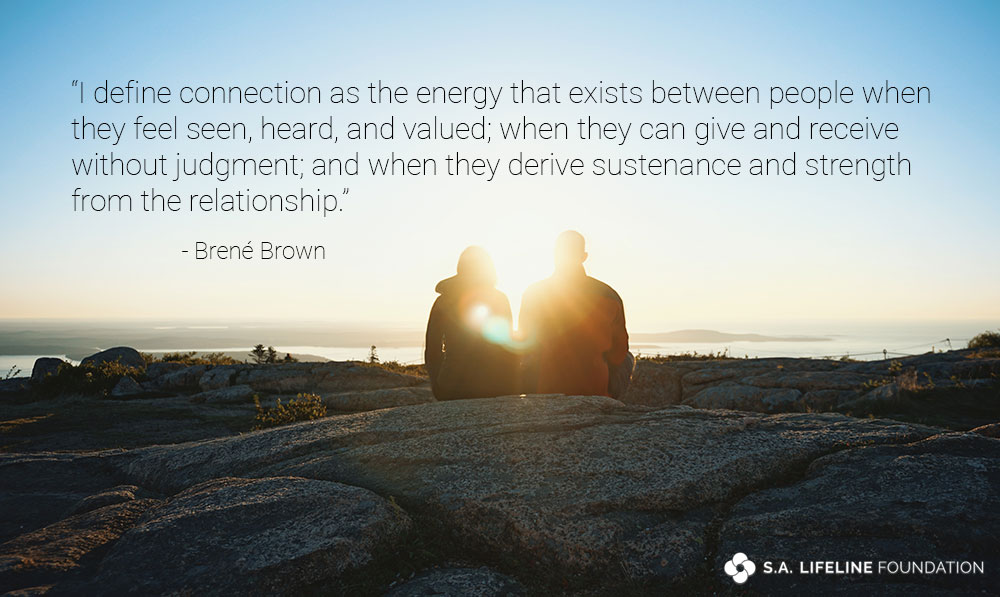
Brené Brown defines connection as “the energy that exists between people when they feel seen, heard, and valued; when they can give and receive without judgment; and when they derive sustenance and strength from the relationship.”
Does anything like that exist in the life of a sexaholic?
This post won’t be long, it may not be that insightful, and it won’t have any agenda.
Instead, I ask one direct question:
Why do addicts have a hard time with real connection?
The word “connection” is mentioned at least 38 times in the White Book of SA. Here are some of its uses:
We went for the “chemistry,” the connection that had the magic… (p. iii)
The sexual arousal gave me the means of flight from reality, and I found myself compelled to escape daily into the ecstatic oblivion that masturbation provided. I had found my “connection;” it was imprinted from the very beginning, and sex would thereafter become dependent on picture-women. (p. 10)
Stealing away, I’d race into the big city, score a connection, and return undetected. (p. 19)
Lonely. The “unconnected” sexaholic is a misconnection waiting to happen. (p. 34)
Thus, we had to connect with ourselves; we became addicted to ourselves. No wonder so many of us found masturbation to be infinitely more than childhood experimentation. It got us high on ourselves, short-circuiting any meaningful connection with others and God. (p. 52)
The Negative Connection: Self-obsession tries to fill this void, since it is a closed-loop connection with the self. Another substitute connection within our selves was masturbation, which often continued through marriage and other relationships as the “normal” experience. But our misconnection went deeper. It seems that with all our human drives – hunger, thirst, sex, power, and the like – the most basic is what we might call the Person-drive, the drive to have union with another. This drive must have its Connection…So, we used sex or lust or relationships to satisfy this drive, letting them take the place of God as a source of our lives. Idolatry. This negative connection never satisfies. (p. 55)
The Negative Connections
Why do we work so hard for the negative connections?
Or are negative connections just too easy?
Porn, masturbation, lust – they are always there, easy to find, easy to hide, easy to justify. They’re like the fast-food restaurants that are scattered all over the freeway exits on a long road-trip: they’re terrible for your health, but they’re quick, easy, and always available.
To repeat the question then, “Why do addicts have a hard time with real connection?”
Is it nature?
Is it nurture?
Is someone or something to blame?
What’s the solution?
For me, the beauty of sobriety and recovery is real connection: with God, with my wife, with my kids, and with my fellows in recovery.
All my connections in the past, at least most of them, were fake, false, a fraud, a hoax, unreal.
Today, I see my friends in recovery as real connections, and I’m grateful to the God of my understanding for a new way of seeing and being.
I look forward to your thoughts and experiences.







I spent so much time in isolation and darkness with my addiction that the idea of connecting to anyone seemed absurd. Look at what I am doing. Though I am hiding and in darkness I do not deserve any connections. I am not worthy. The premise of the 12 steps is trusting in God and turning our will over to God. Why do I need to talk to anyone else? I can recover with God.
Spoken from a man who tried and did not try and did not succeed to overcome his addiction for 41 years.
After finding a sponsor in SAL and after that sponsor made a condition of our relationship that I contact someone every day (in addition to him), and only after did I come to realize that yes God alone can help us and yes we need to turn our will over to God. Part of God’s will (a large part) is that we love one another and through that we share and support one another. That is the only way that I have been able to work on my recovery. When I started those phone calls I probably called the same 3-5 people multiple times a week. Today I have over 35 names in my phone book and I talk, text or email, give or receive at least one a day.
Breaking that barrier of connection is critical to my recovery. Thank all of you that hep me.
I feel I have a real issue right now in desiring connection from my wife. Not just physical but also emotional. It seems that for a long time now in order to be content and sober in my recovery I must have either physical or emotional connection with my wife and no one else. I think this codependency is in part what led to a lapse in my sobriety this week. After a fight that led to a brief separation between us, I couldn’t handle it. I had convinced myself that unless that connection existed I would have no other choice but to seek an immediate (negative) connection almost as an emergency form of connection to help me escape those feelings of loneliness, shame, and self loathing. It seems like I’ve put my wife in my God place. I feel that if I focus on putting God back at the center of my recovery, and seek true connection with Him who is a never changing and a constant form of true connection-I can depend on Him for lifting me in times of loneliness, shame, hopelessness, depression, anger, resentment, and all of those “A” and “B” behaviors that lead to my forms of acting out. I don’t know, at least that’s what this blog post has caused me to consider. 😉